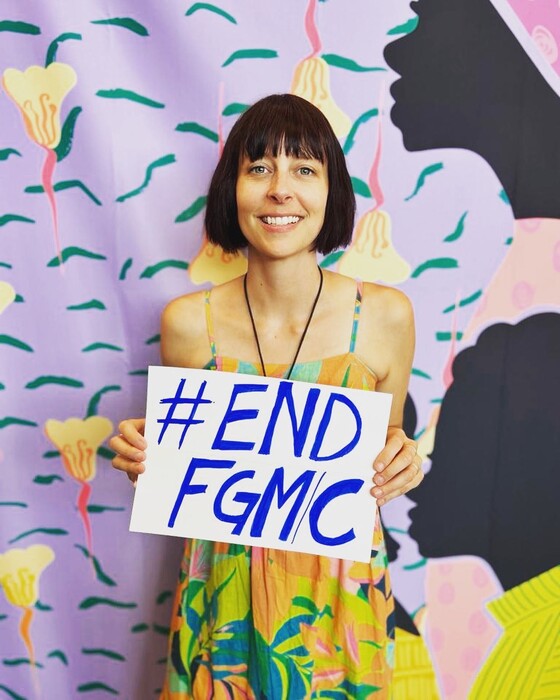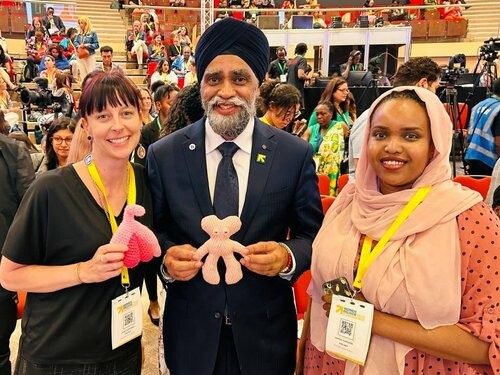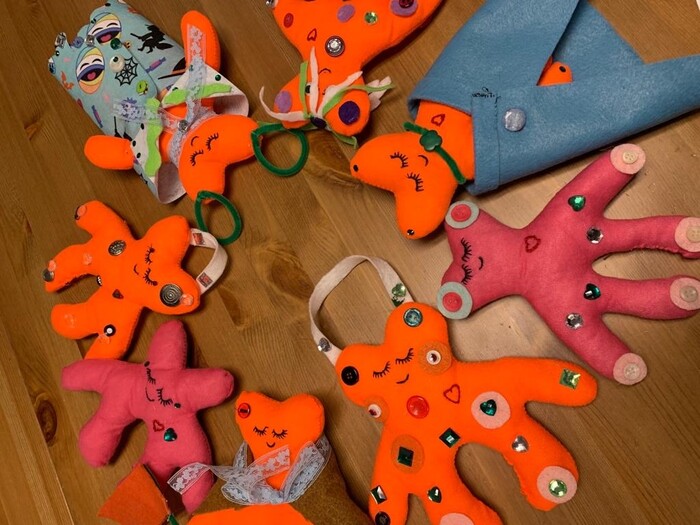Albertans Combating Gender Inequality: End FGM Canada Network
Trigger warning: sexual assault, child sexual abuse
“Only in supporting the voices and actions of survivors and impacted communities will real change take place.” - Alisa Tukkimaki
As part of ACGC’s series on Albertans combatting gender inequality, this next story is with Alisa Tukkimaki, National Director of End FGM Canada Network, a national network with the goal of achieving “a Canada free from Female Genital Mutilation/Cutting (FGM/C), where impacted women and girls are well supported, and girls at risk are protected.” End FGM Canada Network works with impacted stakeholders and allies, in addition to providing essential resources.
Disclaimer: Details and quotes below are taken directly from the interview with Alisa, unless otherwise noted.

Image: Pictured above is Alisa with the End FGM/C hashtag.
----
About End FGM Canada Network
Before going into the work of End FGM Canada Network, it is important to define FGM/C. Simply put, “female genital mutilation/cutting is a procedure performed on a women or girl to alter or injure her external genitalia for non-medical reasons.” FGM/C is a type of gender-based violence and can often be linked to child marriage or be seen as a rite of passage. There are deep medical and psychological consequences linked to FGM/C, such as extensive pain, chronic infections, lifelong urinary and menstrual problems, PTSD, infertility, and even death. Please visit here to learn more about FGM/C.
As Alisa puts it, the “End FGM Canada Network is group of survivors, individuals and organizations working to end female genital mutilation/cutting (FGM/C) and support survivors both in Canada and abroad.” She highlighted three keys initiatives that End FGM currently runs:
- Joining Hands Project – this project involves training frontline professionals to provide culturally sensitive care to survivors and girls at risk of FGM/C. This is a series of interactive, virtual training modules co-created by medical, social work, mental health, law enforcement and education experts. The modules are available in English and French.
- FGM/C Survivor Advisory Council – where survivors have a safe space to share and unpack their experiences.
- Miss Klitty – End FGM’s global ambassador whose goal it is to remove shame and stigma around the female anatomy. Miss Klitty (see examples below) can be created by anyone and is an incredible way of educating about and normalizing the human body. Templates can be found online.
Their Joining Hands project has trained over 500 people so far, their FGM/C Survivor Advisory Council is the first national community of FGM/C survivors in Canada, and Miss Klitty is truly a global phenomenon.

Image: Alisa and Warda Warsame, National Network Coordinator, with the Honourable Harjit S. Sajjan, Canada's Minister of Emergency Preparedness, holding 'Miss Klitty' in Kigali, Rwanda at the 2023 Women Deliver Conference.
----
With a background in community development, gender-based violence, and human trafficking, one of Alisa’s goals as National Director is to raise awareness of FGM/C to the general public. In Canada, FGM/C is illegal and listed in our criminal code as a form of aggravated assault. It is also a form of child abuse. According to a recent Statistics Canada report, anywhere between 94,900 – 161,400 girls and women ages 0 – 49 first-generation migrants and second-generation Canadians who may either be living with the consequences of FGM/C or be at risk of experiencing FGM/C in the future. The at-risk population includes the girls who may undergo vacation cutting, which is when families take their daughters out of Canada to perform FGM/C during the holidays and return before school starts.
Albertans should pay close attention to this issue, because the Statistics Canada report also listed Alberta in the top 3 provinces with girls and women at risk. “We have girls in our schools who are at risk of this abuse happening to them. We need to educate our teachers, frontline service providers, medical professionals, and law enforcement,” says Alisa.
Alisa lists silence and misunderstanding as key challenges around the issue. There is a fear of being perceived as racist or culturally insensitive when standing up against FGM/C. To clarify, though there exists a preconceived notion that FGM/C is a religious practice, “FGM/C is not prescribed in any of the Abrahamic religions… and ultimately is about controlling a girl’s sexuality and her ability to participate fully in society,” according to Alisa. So how does End FGM combat this? In addition to training culturally-informed practitioners who can work within the necessary context, End FGM focuses on the harm FGM/C inflicts on women and girls and the legality of the issue. The Network works with impacted women to elevate their stories and convey the severity of this human rights abuse in Canada. The experiences and impacts felt by FGM/C survivors remain the focal point from which The Network draws direction from.
But women and girls are not the only ones impacted, “FGM/C comes with the very real consequences of breaking up families”, suspected or confirmed cases of FGM/C will involve child protection services and law enforcement. This could result in the child being removed from the family, with criminal charges being laid on the parents and the potential of jail time. In this regard, The Network’s goal is to keep girls safe and families together through education.
What can Albertans do?

Image: 'Miss Klitties,' created by the 2023 Global Connect cohort.
----
The first step is education. End FGM offers a variety of resources, in addition to training in English and French, which can be accessed by anyone. Their Get Involved page also lists ways to become engaged, such as through newsletters and social media, and volunteering and membership.
End FGM’s National Conference is on February 6 and 7, 2024. Register here for the sessions that interest you!
Donate here to support End FGM Canada Network.
For those who are able, there is always action to be taken on FGM/C. As Alisa reflects: “I am acutely aware of the colonial and patriarchal impact on this planet and how my race and privilege have provided me with certain opportunities not allotted to others. Working alongside survivors of FGM/C in Canada and internationally continues to humble me and makes me continuously reflect on my role in this issue.”